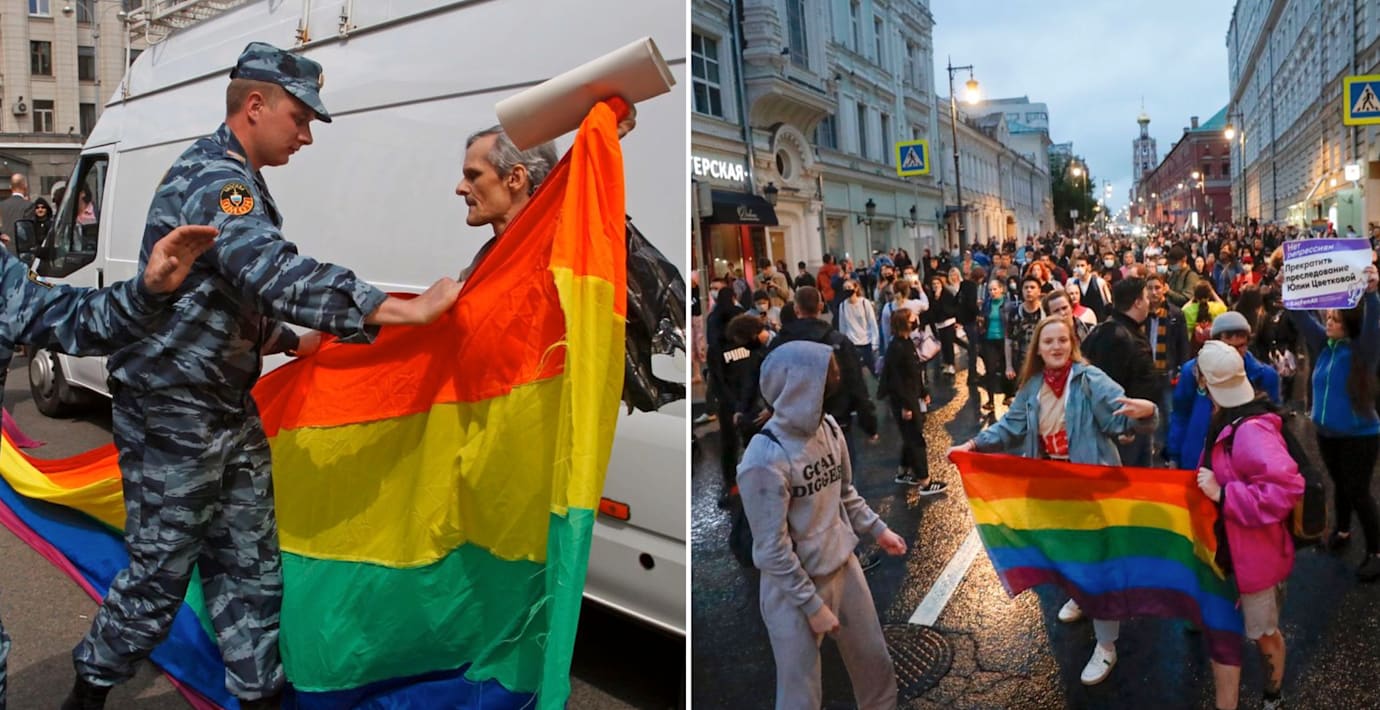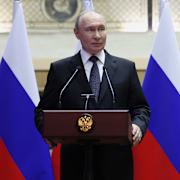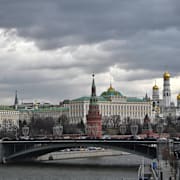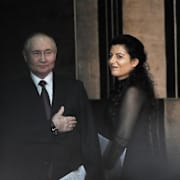
Ryska transpersoner allt mer utsatta under kriget
Situationen för transpersoner och ickebinära i Ryssland har drastiskt försämrats sedan invasionen av Ukraina, uppger aktivistgrupper för Moscow Times.
Inte minst riskerar många transkvinnor som fortfarande är officiellt registrerade som män att kallas in i den transfobiska armén.
Den 35-åriga transkvinnan Nastja beskriver krigets första veckor som ett psykologiskt helvete.
– Hade de mobiliserat då vet jag inte vad jag hade gjort. Jag hade inte mina dokument än [...] i lagens mening var jag fortfarande en man.
I torsdags röstade parlamentet igenom en lag som förbjuder ”hbtq-propaganda” bland vuxna. Hjälporganisationerna Queer Svit och Coming Out vittnar om en ökad utsatthet och allt större behov av psykiatrisk hjälp.
bakgrund
Hbtq-rättigheter i Ryssland
Wikipedia (en)
In the Russian Federation, lesbian, gay, bisexual, and transgender (LGBT) people face legal and social challenges not experienced by others. Although sexual activity between same-sex couples has been legal since 1917, homosexuality is disapproved of by most Russians, and same-sex couples and households headed by same-sex couples are ineligible for the legal protections available to opposite-sex couples. Russia provides no anti-discrimination protections for LGBT people and does not have a designation for hate crimes based on sexual orientation and gender identity. Transgender people are allowed to change their legal gender without requiring sex reassignment surgery; however, there are currently no laws prohibiting discrimination based on gender identity or expression, and recent laws could discriminate against transgender residents. Homosexuality has been declassified as a mental illness.
Russia has long held strongly negative views regarding homosexuality, with recent polls indicating that a majority of Russians are against the acceptance of homosexuality and have shown support for laws discriminating against homosexuals. Despite receiving international criticism for the recent increase in social discrimination, crimes, and violence against homosexuals, larger cities such as Moscow and Saint Petersburg have been said to have a thriving LGBT community. However, there has been a historic resistance to gay pride parades by local governments; despite being fined by the European Court of Human Rights in 2010 for interpreting it as discrimination, the city of Moscow denied 100 individual requests for permission to hold Moscow Pride through 2012, citing a risk of violence against participants.
In December 1917, after the October Revolution, the Russian Soviet Republic legalised homosexuality, discarding of the Legal Code of Tsarist Russia. The legalisation of homosexuality was confirmed in the RSFSR Penal Code of 1922, and following its redrafting in 1926. However, in 1933, the Soviet Union under Joseph Stalin recriminalised sex between men. Article 121 was added to the criminal code on 7 March 1934 for the entire Soviet Union that expressly prohibited only male homosexuality, with up to five years of hard labour in prison. There were no criminal statutes regarding sex between women. During the Soviet regime, Western observers believed that between 800 and 1,000 men were imprisoned each year under Article 121. After the dissolution of the Soviet Union, homosexuality acts between consenting males were re-legalised in 1993, removing Article 121 from the RSFSR penal code.Since 2006, under Vladimir Putin, regions in Russia have enacted varying laws restricting the distribution of materials promoting LGBT relationships to minors; in June 2013, a federal law criminalizing the distribution of materials among minors in support of non-traditional sexual relationships was enacted as an amendment to an existing child protection law. The law has resulted in the numerous arrests of Russian LGBT citizens publicly opposing the law and there has reportedly been a surge of anti-gay protests, violence, and even hate crimes. It has received international criticism from human rights observers, LGBT activists, and media outlets and has been viewed as a de facto means of criminalizing LGBT culture. The law was ruled to be inconsistent with protection of freedom of expression by the European Court of Human Rights but as of 2021 has not been repealed.In a report issued on 13 April 2017, a panel of five expert advisors to the United Nations Human Rights Council—Vitit Muntarbhorn, Sètondji Roland Adjovi; Agnès Callamard; Nils Melzer; and David Kaye—condemned the wave of torture and killings of gay men in Chechnya.
Omni är politiskt obundna och oberoende. Vi strävar efter att ge fler perspektiv på nyheterna. Har du frågor eller synpunkter kring vår rapportering? Kontakta redaktionen



